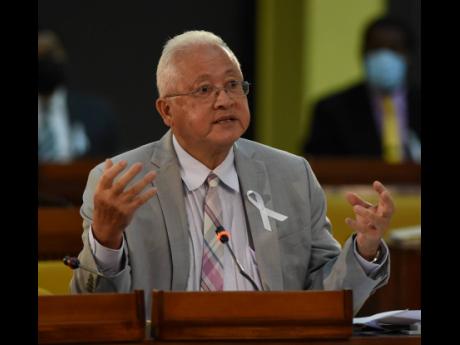Legal logjam - Poor drafting instructions from ministries frustrate process to have new laws crafted
Weeks after three former police chiefs rapped parliamentarians for their lethargic approach to enacting new legislation to curb lawlessness across the island, Justice Minister Delroy Chuck has likened the quality of drafting instructions being sent to the Chief Parliamentary Counsel (CPC) to legal gibberish, further clogging a process already choked by administrative problems.
Speaking at a Gleaner Editors’ Forum earlier this month, former police commissioners Owen Ellington and Hardley Lewin, as well as former Deputy Commissioner Novelette Grant, blamed the country’s legislators for the lack of applicable laws to cure a raft of ills.
During the Throne Speech kicking off the new parliamentary year over a week ago, Governor General Sir Patrick Allen, in outlining the Government’s legislative agenda, admitted that some previous commitments were yet to see the light of day.
In a bid to tame the crime monster, four “complex priority pieces of legislation”, which are currently at the draft bill stage, are being pursued.
NO ATTENTION TO REFORMATION
Chuck told The Sunday Gleaner that Cabinet ministers, who are the policymakers, have not paid sufficient attention to the process of crafting or updating laws, often leaving technocrats to legislative mind reading.
“With respect to legislation, if ministers take a personal and ministerial interest in their priority legislations, the process becomes easier and speedier for the CPC, as policy is clarified and confirmed promptly,” the justice minister said.
Describing the process as “cumbersome and time-consuming”, Chuck said that the Ministry of Justice, through the Office of the CPC, is responsible for drafting the laws, but they are humbugged by the lack of clarity for drafting instructions.
“The first challenge is for the ministries to provide precise, clear and fulsome drafting instructions to the CPC, which would allow the drafter to know and understand the policy position, the intent, purpose and width of the proposed law. Invariably, discussion ensues to refine and clarify the policy and intent,” he explained.
Initial drafting can linger from three to six months, after which come problems.
“ … The drafts and redrafts, going back and forth between the ministry, the Attorney General’s Chambers and the CPC for an extended period of time, [that is] when and during which most pieces of legislation get lost or left behind, most times in the ministries,” said Chuck.
Long recognizing the critical ailment, he has sought injection.
“Since September, and my reappointment as minister of justice, I have decided to personally monitor the flow of these bills between the departments and, hopefully, we will see many protracted legislations being tabled in Parliament in 2021,” he said.
While laws such as the Data Protection Act and the National Identification and Registration Act – on which the National Identification System will depend – and other pieces of legislation required by external agencies such as the International Monetary Fund have been given priority, others seem to have been forgotten.
Among them is the 2018 Road Traffic Act, which remains inoperable for lack of accompanying regulations. The 2014 Disabilities Act also remains handicapped for lack of regulations.
Former justice minister, now Opposition Leader Mark Golding, likened the situation to an iceberg waiting for ships to hit.
“Parliament is just the tip of the iceberg when it comes to legislation. The ministry develops policy, ideally through a process which involves broad consultation. The portfolio minister seeks Cabinet’s permission for drafting instructions to be issued for the legislative aspects of the policy,” he explained.
Citing the quality of drafting instructions to the CPC, he said this is often where the ship sinks.
“This is where things can go off track. The quality of the drafting instructions is very important, and varies widely within the public service. The more detailed and well developed the drafting instructions, the easier it is for the draftsman to convert that into legislation in the form of a draft bill,” Golding told The Sunday Gleaner.
According to him, once the draft bill is prepared by the CPC, it is sent back to the ministry for review and comments. Request for adjustments are often made, leading to a revised draft bill. This is again sent back to the ministry for review and comments, and the process can be repeated several times until the ministry is satisfied.
THE PROCESS
The draft then goes to Cabinet for approval, and is reviewed by the Legislation Committee of Cabinet, usually making several adjustments to the text. The CPC then prepares a final bill for review by the ministry, which the minister then takes to Cabinet for permission to table it in Parliament.
“The problem is really not with the CPC’s office, although they do need additional drafters. ... Far too often, important policy issues have not been adequately thought through when the drafting instructions are sent to CPC. As a result, the drafter is not just putting into legislative language the policy that has been developed by the policymakers, but often has to try to fill in the policy gaps, which is not the role of the drafter,” Golding told The Sunday Gleaner, an explanation spot on with Chuck’s concerns.
The solution, Golding said, lies in training for ministry staff on how to prepare solid drafting instructions.
“They must be able to identify muddled thinking and gaps in the policy that has been developed by the ministry, so that these are thought through and resolved before drafting instructions are prepared and sent to the CPC’s office,” Golding said.
Chuck again wants ministers to become involved in the process early.
“If the relevant portfolio minister gets involved from an early stage, the legislation would take months instead of years, redrafted two or three times instead of six or eight times, and ensure that it returns quickly to the CPC instead of lagging in the ministries. MOJ (Ministry of Justice) is now working assiduously to speed up the process and get more bills tabled in Parliament,” Chuck promised.
The situation is not lost on National Security Minister Dr Horace Chang, who also admitted earlier this month that despite pumping billions of dollars into the national security infrastructure over the past four years, the Government has dropped the ball in enacting accompanying legislation to effectively bring the island’s crime problem under control.


